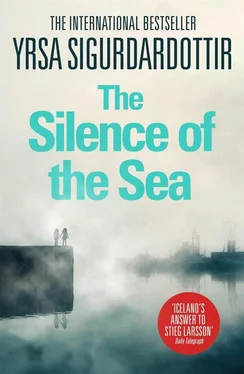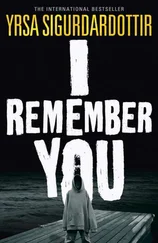‘I wouldn’t have thought so. At least, I’d be very surprised. Ægir was highly professional – not the type to smuggle files home with him. Anything of substance should be here and we’ve already given you and the police copies of everything that isn’t subject to bank confidentiality. I can’t see how information relating to the former owner’s financial situation can be relevant to your case.’
Thóra smiled non-committally and finished her coffee. She longed for a refill but didn’t like to ask. ‘Would you be able to find out if Ægir rang Karítas’s number? I’m assuming he’d have called from the office since it’s work related.’
‘Um, I don’t know. We don’t usually keep track of phone calls but the bills are itemised and long, expensive calls are sometimes charged to a specific project. I can have it checked if you like. It rather depends on how busy the secretaries are, so it might not happen today.’ He held up the photocopy. ‘Can I keep this? Then I won’t have to hunt for the original.’
‘Sure.’ Thóra sincerely hoped no such call had been made. It would only complicate matters and they would probably never find out what it had entailed.
‘Right.’ Fannar darted a glance at the ostentatiously expensive watch on his wrist, which was half-hidden by a sleeve fastened, inevitably, by a flashy cufflink. ‘Oh. One more thing.’ He looked up quickly. ‘Had either of the bodies they found been shot?’
‘Shot?’ Thóra thought she must have misheard. ‘I’m pretty sure they hadn’t. Why do you ask?’
‘I’ve just sent the police some new paperwork that came in yesterday. They rang straight back, anxious to know if there had been a gun on board or if we’d had it removed before they embarked. I hadn’t a clue; it’s the first I’ve heard of any gun.’
It was the first Thóra had heard of it as well. ‘And they didn’t explain why they were asking?’
‘No. The guy rang off as soon as I’d answered his questions.’ He swallowed the rest of the sugar-lump. ‘But it occurred to me that it might be connected to the documentation I’d sent them, and I was right.’
‘What was the document?’ Thóra felt absurdly jealous at not having been entrusted with the same information.
‘It was a survey we had arranged in connection with the valuation of the yacht, which revealed that there was a revolver kept on the bridge. I asked around and apparently the captain has to be provided with one in case of a pirate attack. Can you imagine? Pirates!’
‘Apparently they still exist.’ She wondered if pirates could have boarded the yacht, killed the passengers and sailed away on the boat they came on, all without leaving a trace. ‘There was no mention of any gun in the inventory I received. Is this a different list?’
‘Yes, the list you have dates back to when the bank granted the owner a loan to purchase the yacht, so we couldn’t use it for the latest valuation. The new inventory only came through yesterday. We’d booked an overseas agent to do a survey on the boat a few days before she left Lisbon and the bastard took his time about compiling a report.’ He sighed. ‘Not that it’ll be much use to us now. The yacht’s damaged goods – not just the hull but her reputation too. Unless you can sort that out.’ He smiled.
Thóra returned his smile automatically, her mind on other things. ‘Could I get a copy of the new inventory?’
‘No problem. The police have requested a better version. I sent them a scan by e-mail but the quality wasn’t good enough so they want a hard copy. I’ll have another made for you at the same time.’
While Thóra was waiting in reception, a police officer arrived to collect the inventory. It was the man with the green eyes. If he found it odd to encounter her there, he didn’t show it. Too impatient to observe the formalities, she immediately asked him about the gun. At first he plainly had no intention of revealing anything but then he changed his mind. Apparently the gun listed in the most recent inventory was nowhere to be found on board. The original inspection of the yacht had turned up a small case of ammunition in the pilot house but this had been dismissed as insignificant since no gun was known to have been on board. The new inventory had changed all that. There was no forensic evidence that any shots had been fired on the yacht but six rounds were missing from the case. This indicated that the revolver had been used since the surveyor’s visit, because in his report the case had been full and the gun unloaded.
Thóra received her copy of the list and put it in her bag. Before she left, the detective asked her to drop by after lunch as he wanted to discuss a matter concerning one of her clients – Lára. Although he didn’t reveal any further details, Thóra could tell from his face that the news was bad.
So far the phone call had revolved around how tragic the whole affair was and how much Lára’s co-workers missed her. Thóra kept trying to guide the conversation back to the topic she had rung to discuss but without success; the woman was far too upset. While the resolution committee was directly linked to the circumstances of Ægir’s disappearance and therefore to the police inquiry, Lára’s colleagues were completely out of the loop and had received no news except via the media. Yet the woman was not motivated by nosiness; her questions revealed a genuine concern for the future of Lára’s little girl and the terrible grief her family must be suffering. Only after some considerable time did Thóra manage to get a word in edgeways: ‘The reason I’m calling is that I may need to ask one of Lára’s colleagues – someone who was well disposed towards her – to provide a character witness that would put an end to all speculation about her faking her own disappearance.’
‘Faking her disappearance?’ The woman’s tone conveyed all that needed to be said.
‘It’s just a formality. No one’s seriously suggesting that she did. Might you be willing to provide one? You seem to have known her quite well.’
‘I certainly did. We sat at neighbouring desks, so you could say we knew each other better than anyone else in the company. Though actually there are only five of us in Accounts and Payroll.’ The software firm where Lára had worked was fairly large, so Thóra had been fortunate to be put through to such a close colleague. ‘Anyway, as I was telling you, I really don’t know what to say. Just when everything was going so well and Ægir was enjoying his job at last…’
Thóra interrupted: ‘Didn’t he enjoy it before?’
‘Oh, yes. Well, sort of. He used to work for the bank that collapsed – the one the committee was appointed to wind up – but he wasn’t too happy there; lots of the guys he graduated with had been promoted above him and had more money to play with. Lára told me he’d been held back by the twins; when the girls were small they used to take it in turns to fall ill and he and Lára had to split the child-minding between them. It wasn’t well regarded at the bank – unlike here. At our office it’s taken for granted that parents have to take time off when their kids are sick. What are the banks planning to do if people stop having children? That’s what I’d like to know. Lend money to people in their graves? What sort of bonuses would they get then?’
Thóra ignored this digression. ‘But you said he was happy in his new job?’
‘Yes, or at least Lára gave that impression. His work for the resolution committee was quite different. He didn’t have to listen to his colleagues endlessly boasting about their extravagant lifestyles. I only met him a few times, at work parties and so on, but he seemed a really nice guy. In my opinion he wasn’t the type to chase after money. But it was a good thing fate intervened when it did so he didn’t have to work there any longer; you never know what effect that kind of atmosphere will have on people in the long term. It’s bound to bring out their materialistic side.’
Читать дальше









